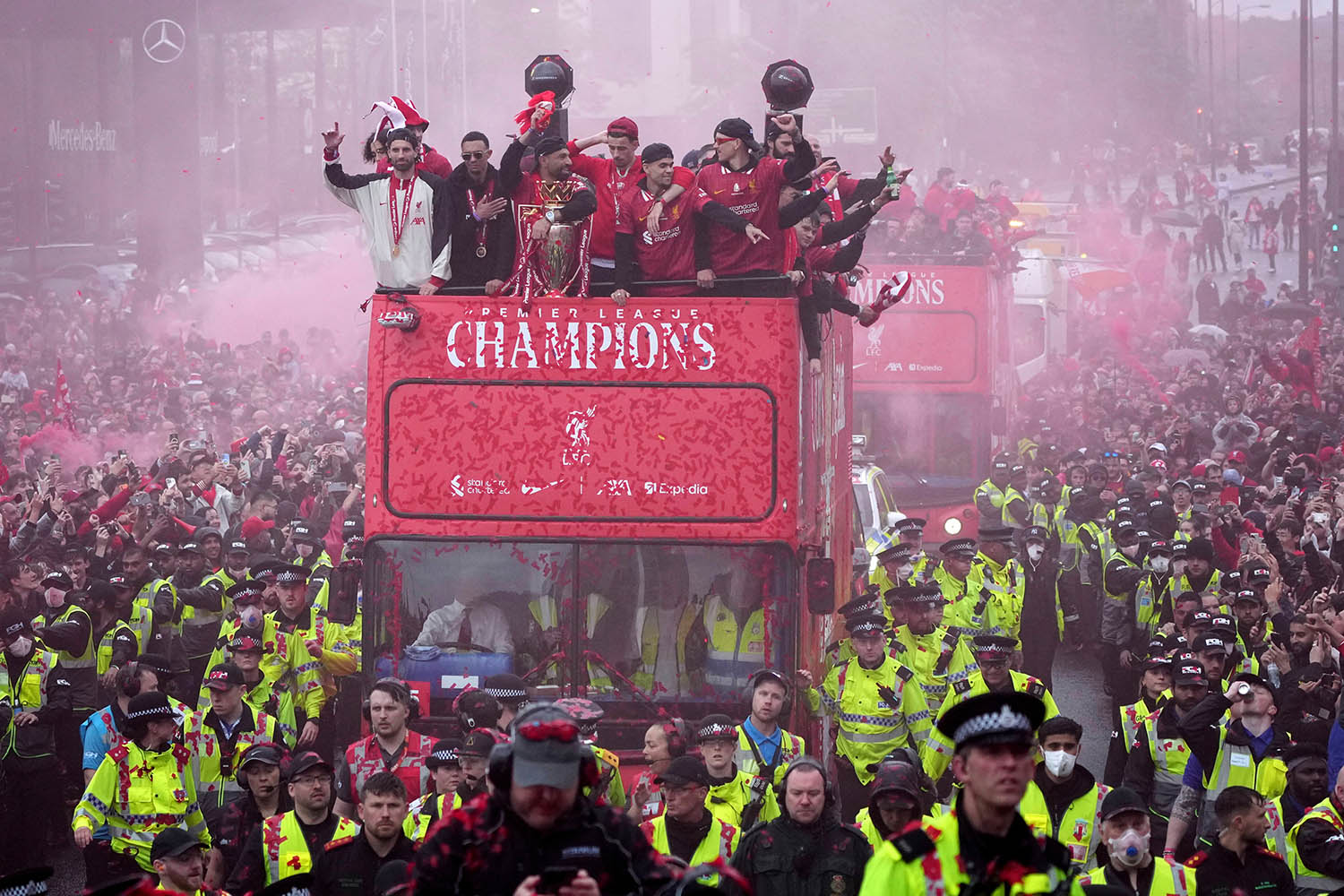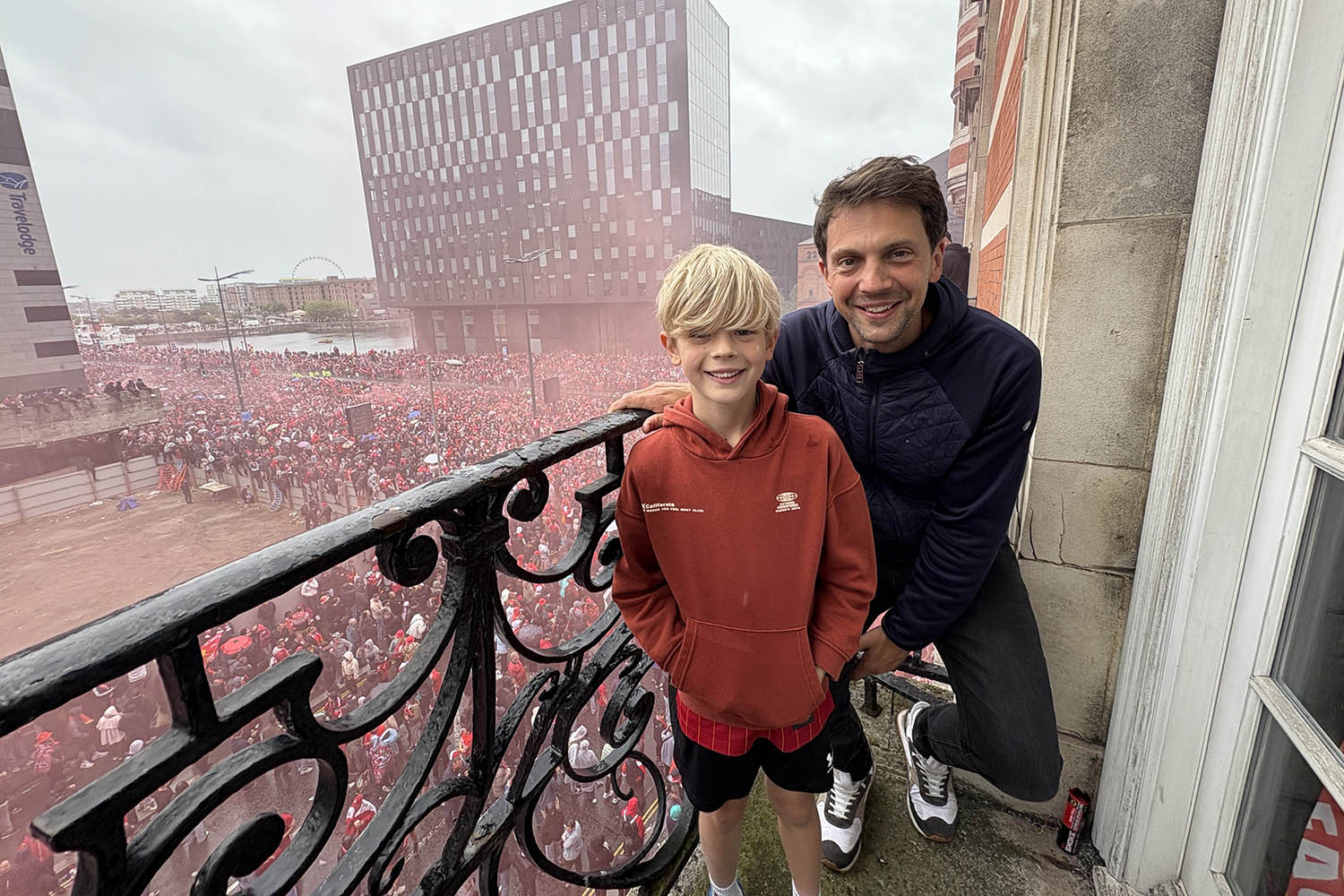There are moments from that weekend that I want to become memories. The sight of my seven-year-old son, Ed, hearing the first strains of You’ll Never Walk Alone rising up from the vast crowd on the Strand, instinctively lifting his scarf above his head, and picking up the lyrics. My father-in-law’s voice cracking just a little as he told me how much it meant to watch Liverpool lift a league title with his grandson.
I want to remember the way Ed could not keep still as he waited for the bus carrying the players to arrive, that he had to keep checking he had not missed them. I want to remember the smoke from the flares blotting out the sky, and the bus carrying the Liverpool team emerging from the mist, and the smile on my son’s face.
I want to associate that weekend, more than anything, with the feeling I had once they had gone past and the sea of people on the Strand started to break. I had, I told my father-in-law, done my best. My son was at Anfield to see Liverpool win the league. He was there again to watch them lift the trophy. He had seen the parade. If he doesn’t turn out to be a fan, it is not through my lack of effort.
But I know, too, that we do not get to choose our memories. I wouldn’t claim to have suffered genuine trauma from what happened on Water Street last Monday. To do so would be self-centred, self-indulgent, profoundly disrespectful: to those who were hurt, to those who must have feared for their lives, for all of those who must now try to find a way to come to terms with what they experienced.
My son is fine. My father-in-law is fine. Thankfully, the friends we had spent the day with were not in the wrong place at the wrong time.
I worry, though, that this is what I will remember.
It must have been just a little after 6pm when we parted at the corner of James Street and the Strand. I had to head south, to the BBC, for a radio commitment. My father-in-law was taking my son to Moorfields station, to queue for a train out of the city.
The streets were strewn with discarded cans and glass, crunching underfoot. I told my son to be careful. I told him to hold his grandad’s hand the whole way. He reached out and clutched it. I gave him a kiss, I think. His grandad reassured me that it would be fine, not to worry. It had been a great day, he said.

Liverpool fans flock around the team bus as the squad shows off the Premier League trophy.
I picked my way through the Strand, weaving between the fans chanting Liverpool’s version of Sway, the Dean Martin song, which honours Federico Chiesa, a fringe player transformed by the magic of scansion into a title-winning hero.
Then, heading towards me, came a fleet of police vans, five of them, sirens blaring. They went past, in the direction my son had gone. I felt a shiver of dread. It was irrational, of course. I had seen him and his grandad no more than two minutes ago. There were a million people on the streets. It would just be a fight. But still: he was here, in this busy place, because of me, because of something I love, and want him to love.
Newsletters
Choose the newsletters you want to receive
View more
For information about how The Observer protects your data, read our Privacy Policy
And then it got worse. I arrived at the BBC. There had been an incident. The police would not say what had happened, but it was in Water Street. That is what I remember: going cold, feeling breathless, a nauseating spike of panic. That was their route, or it could have been their route, to the station. They were heading in that direction.
I’d like to think that I responded as a cool-headed journalist, someone who has been caught in riots and covered terror attacks, and has systems for establishing what happened. I would be lying. I checked my phone. I saw my father-in-law had last been on WhatsApp at 18.27. I went on Twitter. I searched “Water Street.” The first mention of an incident was at 18.15.
That should have settled me. It didn’t. I texted my father-in-law, asked him to let me know he was OK. One tick, not two. My conscious brain told me that was natural: the phone networks had been overwhelmed all day; signal had been patchy; they might be on a train by now. I waited, and waited, and I felt the gentle pull of a nightmare.
That is what I will remember: those 15 or 20 minutes before a message flickered on to my screen, saying they were fine. I thought that would bring relief, but it didn’t. All I wanted was for my son to be as far away as possible. It was 19.20 when the next message filtered through. They were on a train, but not far enough away.
The tragedy of what happened, of course, belongs to those people in hospital, those people hurt physically and scarred psychologically. They are the victims.
Yet sorrow has a greater radius. Liverpool was filled with people wanting to create memories with their families, with their friends. That is what a football club is: a shared memory, passed from one generation to the next.
But we do not get to choose our memories.
Almost a week on, we have not told Ed what happened on Water Street. He will find out one day, I suppose. Maybe he will come to realise why his dad will choose to flick through the photos of that weekend in favour of other matches, other occasions. But for now, he does not need to know. For now, he can remember that day as it was supposed to be remembered. That is what I can give him, as his dad: just this once, I can choose his memories for him.



